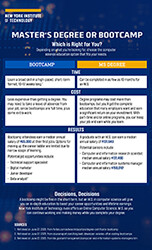From artificial intelligence, to green energy, to life-saving medical technologies, digital advancements are improving the way we make use of the world’s resources. And for each potentially world-changing digital innovation, there is a need for computer scientists to design systems, write software, test and implement systems, and maintain and adapt technologies as the world evolves.
Because of this high demand, the employment outlook for computer scientists is projected to increase 21% from 2021 to 2031, which is much faster than the average for all occupations.1 Within the computer science realm, a few of the possible career paths include:
- Hardware and software developer
- Cybersecurity
- Research and development
- Programming language creation
Just as there are many types of careers for computer science professionals, there are different types of education that can provide entry into the field. Find out more about the pros and cons of each type of computer science education.
Certificates
Certificates generally have a very narrow focus on a particular topic. A certificate can be earned quickly, usually in a year or less. Because a certificate program can be narrow, it doesn’t often help you get a job in a different field. It can provide a way to dip your toe into computer science and decide whether you’d like to get more education.2
Bootcamps
Bootcamps help attendees learn specific skills in a high-paced, short-term format. Because bootcamps are time intensive—usually 10 to 12 weeks—it is not possible for most people to work and complete a bootcamp at the same time.2 They also usually cannot cover the vast amount and variety of information that’s necessary to reach higher level positions because of the short timeframe.
Computer Science Degrees
An M.S. in computer science takes longer to earn and may cost more, but your return on investment is higher because a degree provides a depth and breadth of learning that a certificate or bootcamp can’t. Within a master’s advanced curriculum, you’ll gain intimate knowledge of every aspect of computer science so that when you graduate, you can jump right into your position versus needing to be extensively trained.
Unlike one-off courses, a master of computer science advances your education significantly and offers the opportunity to specialize in an area of interest.2 Because of its graduate-level distinction, a master’s in computer science also will provide you with valuable networking opportunities (both with your teachers and your cohort), career resources, and more one-on-one support than other, short-term options. You can use these to your advantage while seeking new positions or advocating for a promotion within your current one.
Any education outside of work will have its benefits, but a computer science degree gives you the most flexibility for your chosen career path and abundant job opportunities.
Benefits of a Computer Science Degree
A degree in computer science prepares you for a career, not just a job. Throughout your education, you will gain an in-depth understanding of computer science concepts and theory. The subject matter that is covered gives you both a wide and deep understanding of:
- Advanced math and science
- Foundational knowledge in computer programming
- Algorithms
- Networks
- Databases
- Operating systems
- Programming languages
Required and elective courses in communications, sciences, ethics, and liberal arts will give you a well-rounded education. You also may choose to explore topics that align with industries or technologies you want to pursue, such as information security or data science. Universities often help students with internship and co-op placements that can give you a flavor of a company and industry while you are still working toward your degree.
With an M.S. in computer science, you will receive the type of education that employers like to see in their new hires. Technical knowledge and skills are highly important, but communication skills and a broader understanding of the world makes you a more thoughtful and collaborative team member.

Which Education Option is Best for You?
Take a look at this handy infographic to understand the pros and cons of a computer science degree versus a bootcamp.
Important Considerations for Bootcamps and Certificates
A bootcamp or certificate might be right if you find that lack of a very specific type of knowledge is keeping you from advancing in your job or career. Certificates allow you to study part-time while you are working and can usually be earned in a year or less. If you are considering changing careers to computer science, a certificate can give you enough information about whether the field is for you. However, a certificate alone is not a valuable enough credential to help you get a job in a field where you have no experience.2
Bootcamps are usually 10-12 week immersive courses where you learn a highly specific skill, such as coding in a new programming language. While a bootcamp is less expensive than a degree, it may require a leave of absence from your current job, so the loss of income should be figured into the total cost. A bootcamp teaches a skill, but it can be a long-term disadvantage that the comprehensive theoretical knowledge behind the skill is not part of the coursework.2
Comparison of Outcomes
Earning potential is an important aspect when evaluating which type of credential you decide to pursue.
Certificate
Upon earning a certificate, entry-level jobs such as customer support, IT and network support, and software testing will be available to you. With relevant job experience and additional skills, moving into higher-level jobs is possible.3
Bootcamp
Graduates earn a median salary of $65,000 at their first jobs.4 After completing a bootcamp, some of the potential job opportunities are:
- Technical support specialist
- Digital marketer
- Junior developer
- Data analyst
- Web developer
- User interface (UI) designer4
M.S. in Computer Science
This advanced degree opens up even more opportunities and earning potential: those with a master’s degree make an average of $30,000 more in an annual salary than those with a bachelor’s degree.6
Some general job categories include:
- Computer and information research scientist: median annual salary $131,490
- Computer and information systems manager: median annual salary $159,0105
Factors to Consider When Choosing an Education Path
As with any profession, the amount and type of education you get can either limit your opportunities or open up multiple career paths. Only you can decide if you would rather get a certificate quickly and start in an entry-level position, then work your way up into higher responsibility and compensation. Perhaps you see coworkers getting promotions because they can program in a language you don’t know, and a bootcamp will be worth taking a leave of absence.
An M.S. in computer science requires a financial commitment, but with a potential payoff of many times the cost over your lifetime career. Many companies now require a master’s degree for all their computer science hires because of the breadth of knowledge graduates have. Degree programs often offer flexible learning, with online and part-time options available.
- Retrieved on June 27, 2023, from bls.gov/ooh/computer-and-information-technology/computer-and-information-research-scientists.htm
- Retrieved on June 27, 2023, from forbes.com/advisor/education/degree-certificate-bootcamp/
- Retrieved on June 27, 2023, from research.com/careers/computer-science-careers - 2
- Retrieved on June 27, 2023, from coursereport.com/blog/web-developer-salaries-after-coding-bootcamps
- Retrieved on June 27, 2023, from bls.gov/ooh/management/computer-and-information-systems-managers.htm
- Retrieved on June 27, 2023, from fortune.com/education/articles/these-3-computer-science-masters-jobs-pay-at-least-120000/

